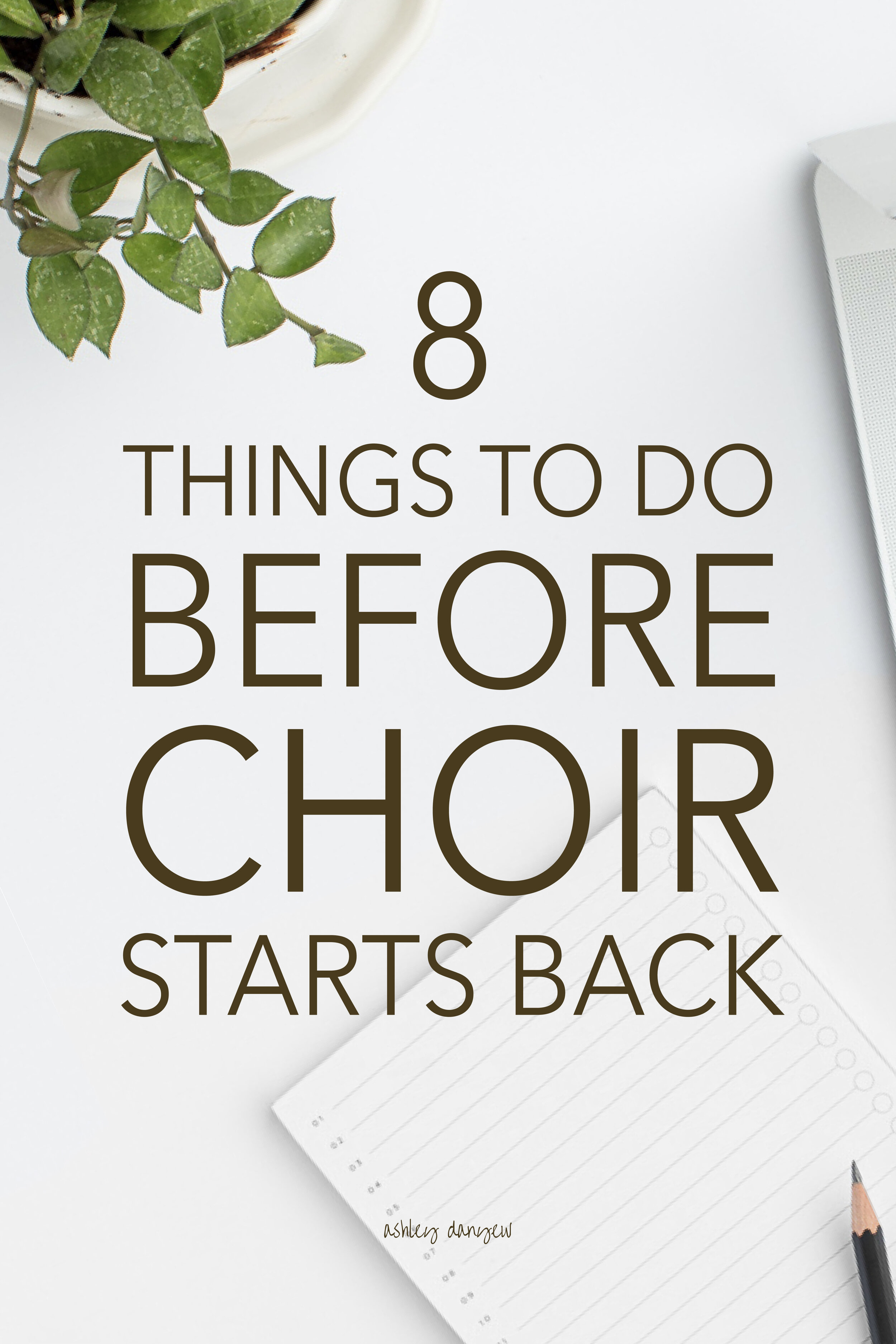A successful, productive choir rehearsal takes proper preparation, careful planning, good time management skills, and attention to detail.
As choir director, it’s important for you to plan your rehearsal time carefully each week.
Think about these questions: What do you want to accomplish? What do you want your singers to learn? What skills are you working to develop?
I recommend dividing your rehearsal time into five components:
Warm-ups
Music for Sunday
Other Anthems
Announcements
Devotion/Prayer
On the day of your rehearsal (or the day before), spend some time planning each category carefully.
Choose warm-ups that tie in with a new musical skill or concept or reinforce something you were working on last week. Plan how you’ll introduce a new anthem. Identify practice spots in review anthems so you know right where to start. Make a list of any announcements or reminders you need to share.
Remember, “Success in the choral rehearsal is a direct result of thorough planning.” - Katherine Tiefel (source)
How to Structure Your Church Choir Rehearsal
Warm-Ups (5-8 minutes)
Warm-ups are a practical way to warm up the voice, but they're also a good way to get focused, improve listening skills, and prepare or reinforce new concepts. Include stretches, breathing exercises, vocal slides/sirens, and a few patterns that focus on vowels, tone, resonance, and breath support.
Think about a challenging phrase or motive in a new anthem and create a warm-up to introduce it. See if your singers make the connection when you pull out that anthem later in rehearsal!
Related post: 50 Awesome Choral Warm-Ups for Church Choirs
Music for Sunday (8-10 minutes)
I like to rehearse Sunday's anthem and any service music at the beginning so there are no surprises at the end of the night. Ideally, your choir will already be familiar with Sunday's anthem, so a quick run-through might be all you need. However, I usually allocate 10 minutes, or so, to give us plenty of time to review sections and parts, as needed.
This is also a good time in the rehearsal to review service music: introits, baptism response, prayer response, benediction response, etc. Have extra copies on hand and make sure everyone has a copy in their folder, ready to go for Sunday morning.
Related post: How to Use Choral Service Music in Worship: A Few FAQs
“Success in the choral rehearsal is a
direct result of thorough planning.”
Other Anthems (55-60 minutes)
Choose 5-6 other anthems from the folder to rehearse (in full or in part). I tend to start with new or newer anthems (4-5 Sundays out), working my way backward through anthems that are progressively more familiar. Save their favorite (familiar) anthem for the very end of rehearsal.
Related post: Fifty (More!) Favorite Anthems for Church Choirs
Plan out how much time you want to spend on each piece. Anthems tend to fall into three categories: new, in progress, and familiar. New and familiar anthems may need only 5-10 minutes while in progress anthems may need 15 minutes for more detailed work. This may change a little in rehearsal, so be sure to leave yourself a little wiggle room (+/- 5 minutes).
Spend a little time reviewing each anthem before rehearsal and choose rehearsal segments for each one. What are your goals for the rehearsal? What would you like to get through? What will you focus on? What do you want to remind them about? Jot down a few reminders for yourself.
Announcements (5 minutes)
After three or so anthems (not counting Sunday's music), take a quick break to share any announcements or reminders: mention sign-up sheets, pass around cards to sign, welcome any new members, etc. If you don't have any announcements, share a joke, read a few bulletin bloopers, or give your choir a 5-minute "talk break" so they'll be extra-focused for the second half of rehearsal. :-)
Devotion/Prayer (5-10 minutes)
What makes a church choir different from a community choir? The element of spiritual formation. Yes, it is a social gathering and hopefully, it's a rewarding musical experience, but it's also an opportunity to grow in faith and fellowship with one another. Give people an opportunity to share prayer requests and leave a few minutes at the end of rehearsal for a quick prayer.
(Alternatively, you could do a short devotion as your break in the middle of rehearsal and do announcements and a closing prayer at the end. Feel free to mix it up!)
If you don't feel comfortable praying on the spot every week, read a written prayer, an excerpt from a prayerful anthem you're working on, or a verse of a hymn from your hymnal (see Prayers for Church Choirs for more ideas). If others in the group feel comfortable, ask them to lead a short devotion or prayer one week.
Here are three devotions/prayers for choirs to get you started:
Joy and Sorrow
For Love
For Renewal
Rehearsal Plans
Some people feel most prepared for rehearsal when they have a multi-page lesson plan in hand. I find it hard to follow a detailed plan in the moment, so I usually simplify my rehearsal plans to a bulleted outline that fits on a single page.
Free Download
Download and print your copy of this choir rehearsal plan template.
I’d love to hear your thoughts:
How do you plan for choir each week? What do your rehearsals look like?
P.S. Check back on Wednesday for my best tips for running a successful rehearsal!
Read more:
7 Tips for a More Productive Choir Rehearsal
6 Tips for Effective Choir Practices
Great Choral Rehearsals
5 Quick Rehearsal Planning Tips
Choir Rehearsal Game Plan







































